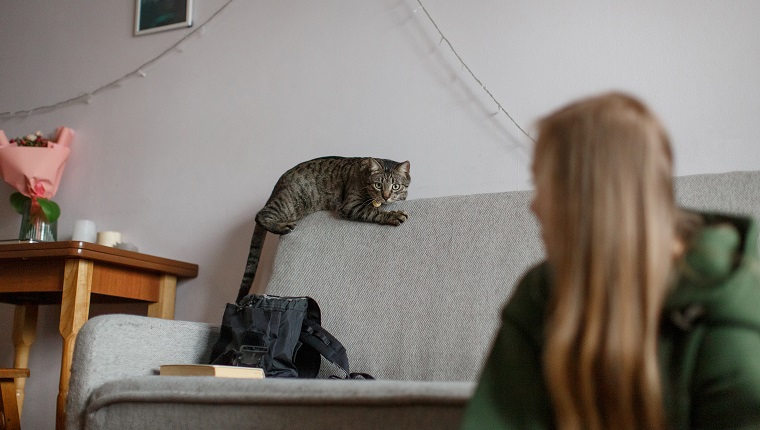Cats can mentally map the location of their humans, according to a new cat study conducted out of the University of Kyoto in Japan.
The Guardian reported that findings support a higher level of cognitive functioning than previously thought.
Doctor Saho Takagi, of the University of Kyoto, set out to investigate how cats mentally map location for something of meaning to them. We’re well aware that cats have a means of doing this when hunting, but what about figuring out where we are?
How Researchers Conducted This New Cat Study
“It is said that cats are not as interested in their owners as dogs are, but we had doubts about this point,” Dr. Takagi explained in the journal PLOS One, where the study was published.
We humans do, of course, play a meaningful role in the lives of our feline friends.
In order to ascertain how a cat tracks our movements, or if they even do, Takagi individually recorded 50 domestic cats. Researchers closed each cat off inside of a single room, while their human called for them from outside of the room.
The idea was that each cat would come to know that their human was not in the room with them because they were calling from outside.
Then, researchers projected either the cat’s human’s voice via a speaker inside of the room, or a stranger’s voice as a control to the experiment.
When the cats could suddenly hear their parents’ voices inside the room with them, they demonstrated surprise and confusion. Certain head and ear movements relayed this.
What The Findings Support

Initially, the cats clocked their parents’ locations as outside the room. Their confusion at the sudden location change suggests a disruption to how they tracked their humans.
What this finding supports is a higher cognitive process for both imagination and planning. Cats may be able to create a mental representation of us that they know how to follow, suggesting that we’re beheld by them as something of great importance.
“This study shows that cats can mentally map their location based on their owner’s voice,” reported Takagi. “[It suggests] that cats have the ability to picture the invisible in their minds. Cats [may] have a more profound mind than is thought.”
Roger Tabor, a biologist and the author and presenter of the BBC series Cats, acknowledges that these findings aren’t entirely surprising.
“That awareness of movement – tracking things they cannot see – is critical to a cat’s survival,” Tabor says.
“A lot of what a cat has to interpret in its territory is an awareness of where other cats are… A cat’s owner is extremely significant in its life as a source of food and security, so where we are is very important.”
A Crucial Bond Between Human & Feline
This much is clear from the study: cats do have a more significant bond with us than previously thought. But why was this ever the thought?
Separation anxiety, for one thing, has clearly indicated that this is the case. Cats definitely know when we are not present, so it follows that they know we exist somewhere out of sight.
“Cats have a close relationship with us, and most feel settled and safe within our company, so our human voice would be part of that bond or relationship,” says Anita Kelsey, author of Let’s Talk About Cats and a UK feline behaviorist.
“When I am dealing with cats that suffer separation anxiety, I usually do not advocate playing the owner’s voice in the home as this can cause anxiety with the cat hearing the voice, but not knowing where their human is,” Kelsey explains.
CatTime has a guide to spotting and reducing separation anxiety in your cat here. We also have a guide to surprising causes of separation anxiety here!
Does this new cat study suggest that our bond with cats has been underestimated? Do these findings surprise you at all? Let us know in the comments below.









